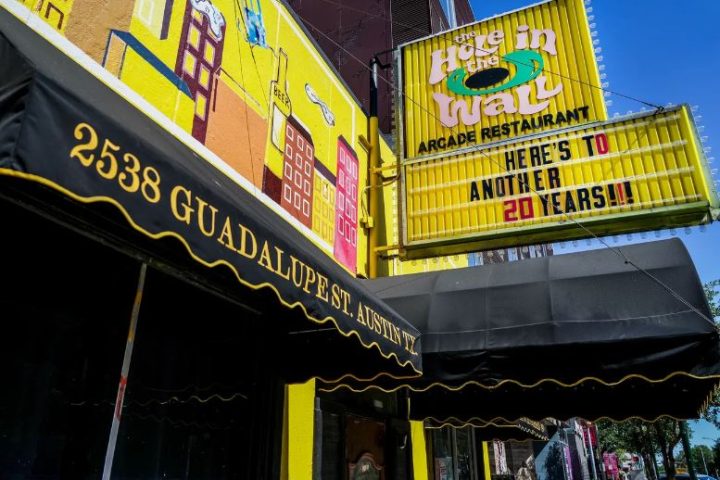I occasionally do short interviews with playwrights as part of my gig as the member rep for ScriptWorks, and in the last month or so I did a few of them a little differently, focusing on specific events I’d seen online instead of asking more standard background questions.
Mostly so I can easily reference them somewhere (our archival process is pretty lacking) I’m listing them all here: interviews with Rita Anderson, Joanna Garner, Sarah Loucks and Jelisa Jay Robinson.
**RITA** (July 11, 2017)
Recently I noticed on social media that member Rita Anderson had hosted a couple of play readings at her home. I wanted to ask her how that went for her, and what she thought of the Austin theater scene in general…
I understand you’ve hosted a few readings and events at your house. What inspired you to go this route?
Need (to hear new work out loud). Interest(ed in closed readings in a private setting while work is “under construction”). Desperation (for expediency. NOTHING moves quickly in theatre.)?
What’s been the most challenging aspect of hosting an event at your home?
It takes considerable prep work to host anything, if you do it well. Also, at this juncture, I’m operating as a one-woman band in prepping.
What’s your process of getting actors like?
Luckily, I’m pretty aware (and getting more aware as time progresses) of local talent. [I also have the secret weapon of a few veteran Austinites whom I trust for recommendations, if I get stuck or am on the fence.] I read a script and picture who might best embody a role—then I just ask the actors if they’re interested/available to participate. The response has been overwhelmingly positive! For the last two events (April and June), I approached directors and they assembled the casts. That ingredient not only took off some of the burden but also I learned a lot about casting, primarily that, as a playwright, I cast differently than directors do. They seem to have a knack for essence, and I tend to cast more stereotypically, I guess.
Do you provide snacks?
Absolutely. It’s the least I can do to thank the actors/directors for their time. Plus, it gives us a little time to relax and be social. I’m also super-relational by nature, and relationship-building is critical for the trust needed to create good art.
You and I have talked about the lack of theatrical space in Austin. Do you think this problem will get worse? Or do you see it improving at some point?
It is a bit terrifying, yes—especially because I moved to Austin from San Antonio a year and a half ago FOR theatre/new works. My bottom line is, I like where we live and I don’t want to “flee” to NYC or Chicago in order to do it. A wiser person than me recently said, basically, in all troublesome issues, you have two choices—to CURSE or to INVEST. So, I’m investing. I want to stay here and to help fight to find and/or create new venues for art, if that’s where we are as a community.
Is there any significant piece of advice you’d give to other playwrights who might be considering hosting his or her own in-home reading?
Just that (a) you are not alone: try to connect with other, like-minded artists you want to work with and admire, (b) don’t ask too much or be “production-only” focused straight out of the gate: Let the readings be their own things, and (c) there is nothing new, really, about these intimate gatherings as stand-alone artistic experiences. In playwriting travels, I’ve participated in many such theatrical events from conferences (ATHE, ASTR, CDC) to writing retreats that culminated in Chamber Readings (Creede, CO, etc.).
**JOANNA** (July 18, 2017)
I recently saw a note on Facebook about Joanna Garner’s latest production PLEASE OPEN YOUR MOUTH in Seattle, and I decided to ask her a few questions about her experiences in Texas and Washington:
Having been involved in productions in Seattle and Austin, would you say there are any notable differences in the arts communities?
Definitely. To state the obvious, Seattle is a bigger city (metro pop 3.7 mill vs 2 mill). There are two LORT theaters, one of the country’s biggest children’s theaters, a huge musical theater house, a handful of mid-size, and lots of small companies. There’s enough work (though artists would definitely say not enough) to support people making their careers in the arts. You can be a director, actor, designer here and, yes, have some side work, but generally get paid for what you do, sometimes well. Austin has some phenomenal actors, but they are really in demand. When I do a show in Austin, I feel like I have to work really hard to get actors to commit, even when I’m paying. I’m guessing they are over committed and also have full-time day jobs. In Seattle, for Please Open Your Mouth, for example, we posted the audition notice and had more than 60 people sign up within the first day. The talent pool is just much bigger.
Austin is doing, on the whole, more wild, messy, experimental work. It’s more interdisciplinary. Its artist are super comfortable with devising and unconventional processes, which is fantastic. Audiences are accustomed to weird, participatory experiences. We have Fusebox! So, Austin is a great place to make new work, but also one without much financial support. I look at the big theaters in Seattle —ACT, Intiman, Fifth Avenue (which does musicals), and Seattle Rep (UT alum Kristin Leahey is now their Literary Director), and they all have great play development programs. In Austin, ZACH doesn’t make that a priority at all. So, when the theater at the top isn’t trickling down commitment to new work in its own city, that sets a bit of a tone about what’s worth spending money on.
The Seattle theater community, though quite large, actually feels more cross-pollinated than Austin. There’s a super active Facebook group with almost 5,000 members sharing resources. 14/48: The World’s Quickest Theatre Festival is HUGE in Seattle, and happens twice a year, which brings all sorts of artists together. Austin’s 14/48 is growing, which is exciting!
It also feels easier to get audiences to see shows up in Seattle. I think that’s because there is still fairly robust theater coverage in the daily and weekly papers, as well as on some blogs and radio. Doing marketing for a few of my self-produced shows in Austin was super challenging. I had to do a lot more pavement pounding and community outreach to sell tickets. Audiences feel much more insular in Austin– theater people seeing theater.
I think of Austin as a kind of hot and brushy place, whereas Seattle is sort of dark and wet; do you think these environments impact the types of productions in each location?
I do. I feel like plays in Seattle often have a heaviness to them. Seattle to me is grunge + goth + stark technology + old fishermen. Austin is sun + beer + playground + swimming + young, attractive people. Austin is laid back and friendly and messy. Seattle is a bit more formal, polite, and polished.
When your play 100 Heartbreaks, about a lovelorn country singer, was performed in Austin it seemed like a great fit for a southern town, but it was developed in Seattle; do you think it was received any differently there than here?
In some ways, it felt like a novelty in Seattle. Ooh, country music, how quaint! In Austin it was like just another night out. The play really came alive for me in Austin, especially performing at the Sahara. There aren’t too many bars in Seattle where you can go to see live country music regularly.
If there were one element/concept/thing you could inject into the Austin theater scene from Seattle, what would it be? And what about the other way around?
Seattle could inject Austin with a real culture of significant arts philanthropy
Austin could give up some wildness
If you could easily move to a new city anywhere in the world and pick up the theater mantle there, where would it be?
Oh god. This is what I’m trying to figure out right now! You’re hitting on my great existential crisis! I’m assuming you’re asking, “Where would I want to go and assume a leadership role and direct the future of the city’s theater scene?” I like to build from the ground up, so I wouldn’t want to go somewhere already established. I’m actually really interested in Santa Fe right now actually because of Meow Wolf. I don’t think traditional models of theater making work anymore. Audiences want experience, immersion, tech integration, play, and community building. I like the idea of a town with kind of an underground DIY theater scene that has a really robust visual arts scene. I want to make worlds for people to play in, and we need new models and new visions to make that happen.
**SARAH** (July 26, 2017)
Sarah Loucks has a new play that she produced with her company MouthRadio. We caught up with her last week, just after the play opened, to ask a few questions…
What prompted you to create your own production company?
I wanted to create opportunities for myself, rather than wait for them to come to me. My younger brother plays in punk bands, so I grew up around a lot of DIY ingenuity and it felt natural to apply that to theater making.
Where did you get the inspiration for your current production, CRAVE BLUE? Do you have any personal connections with Balmorhea?
I knew I wanted to write a play about West Texas mermaids because I thought it was a weird bad idea. I love the West Texas landscape. At the time, I was doing a lot of writing and thinking about how landscape informs how we live and view the world. I was trying to figure out how to deal with mermaids in a desert landscape, and a late friend of mine mentioned that he grew up in Balmorhea. On a trip to visit my Mom in New Mexico, I stopped at the lake in Balmorhea and basically wrote the structure of the play sitting by the lake.
What’s your favorite thing about producing your own work?
Being able to take BIG RISKS.
What’s your least favorite thing?
Worrying about the consequences of BIG RISKS.
Your website lists two additional productions in the works; will you continue producing in Austin for the foreseeable future?
That’s the plan. Next up is a play tentatively called Landscape Mechanical. It’s about automotive engineering and user manuals. There will be an engine opera. Maybe the audience will learn how to change their oil.
Care to share any thoughts on the challenge of finding production spaces in town?
It’s hard. The original venue we booked was closed by the fire marshal two weeks before going into rehearsal. But I’m learning to embrace alternative spaces in a way that’s bettering my practice as an artist. I’m trying to stay positive!
**JELISA** (August 8, 2017)
I recently took a ScriptWorks-sponsored playwriting class with Jelisa Jay Robinson after attending her June Salon. And then I noticed a big update about her busy summer on Facebook, so I decided to ask her for a few questions…
Have you had time to work on DELIVERY since the salon reading in June?
Yes, I’ve been working on DELIVERY rewrites, getting feedback from friends and working on the story. The Salon was super helpful, because it was the first time that I heard the work aloud. I am grateful to ScriptWorks and Christi Moore for setting up the reading and to everyone who came.
I know finding motivation and inspiration for the fast-paced writers’ workshop we took was occasionally difficult; any lasting impressions from that class or how you might approach it differently next time?
I enjoyed that class! The class lit a fire under me to crank out pages. It was challenging because my first thought is to edit myself, but the class was so fast that I had to turn it in. Caridad Svich is incredible. She gave so much amazing feedback and information. I would diffidently take the class again. If I were to take it again, I’d put even more time into it.
I know you’re a teacher; is all this summer activity about getting everything you can in before school starts up again?
I’m honestly trying to take my own advice. I tell my students to “follow their dreams” all the time, but I have to make sure I’m following mine as well.
Any particular plans or goals for 2018 at this point?
At this point, I am working on producing a workshop reading for DELIVERY, and applying to teach English abroad in Spain. I’m also hoping to prep for graduate school applications, write more, and enjoy myself in 2018.



